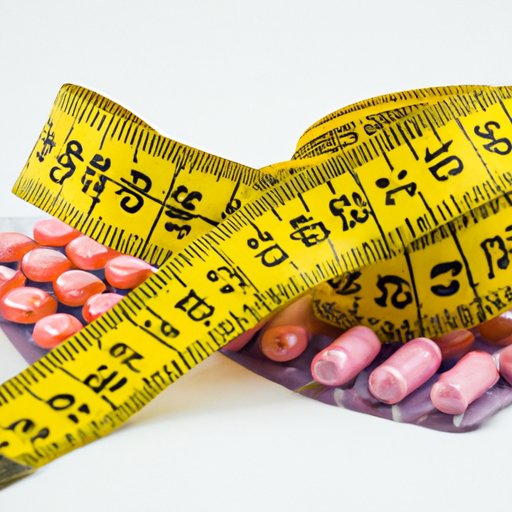
Introduction
One of the most common myths surrounding the pill is that it leads to weight gain. Many women avoid taking hormonal contraception due to this belief, leading them to opt for less effective methods or forego contraception altogether. But does the pill actually cause weight gain? In this article, we dispel the myths and explore the truth about weight gain and hormonal contraception.
The Truth About Weight Gain and the Pill: Dispelling Myths
There are several misconceptions about weight gain and the pill. Some people believe that taking the pill causes women to gain weight rapidly and uncontrollably, or that it causes a significant increase in body fat. Others believe that the hormones in the pill cause water retention, making women feel bloated and heavier. However, these beliefs are not supported by scientific evidence.
Studies have shown that any weight gain caused by the pill is typically small and gradual, with an average gain of less than 5 pounds over the course of a year. Additionally, studies have found that there is no significant increase in body fat or water retention in women taking the pill compared to those not taking it.
Weight Gain and Hormonal Contraception: What You Need to Know
There are several different types of hormonal contraception, including the pill, the patch, the ring, and the injection. Each type contains different amounts and combinations of hormones, which may affect weight gain differently. For example, some types of hormonal contraception may contain more estrogen or progestin, while others may contain a combination of both hormones.
It’s important to note that the hormones in hormonal contraception can also have other effects on the body, such as reducing acne, regulating periods, and preventing pregnancy. So while weight gain may be a concern for some women, it’s important to consider the overall benefits and risks of hormonal contraception before making a decision.
The Link Between the Pill and Weight Gain: Separating Fact from Fiction
Research on the relationship between the pill and weight gain has been somewhat inconclusive. While some studies have found a link between hormonal contraception and small amounts of weight gain, others have found no significant difference in weight gain between women taking the pill and those not taking it.
Additionally, many studies have limitations that make it difficult to draw firm conclusions. For example, some studies rely on self-reported weight gain, which can be inaccurate. Others may not account for other factors that can contribute to weight gain, such as lifestyle and genetics.
Can the Pill Cause Weight Gain? Understanding the Science Behind the Claim
There are several ways in which the hormones in hormonal contraception may affect weight gain. For example, estrogen can affect appetite, while progestin can slow down metabolism. Additionally, hormonal contraception can affect insulin sensitivity, which can lead to weight gain or difficulty losing weight.
However, it’s important to note that hormonal contraception is just one potential factor that can contribute to weight gain. Lifestyle factors such as diet and exercise, genetics, and underlying health conditions can also play a significant role in weight management.
The Impact of the Pill on Your Weight: Debunking Common Misconceptions
There are several common beliefs about weight gain and the pill that are not supported by scientific evidence. For example, many people believe that the pill causes water retention, leading to bloating and weight gain. However, studies have found no significant difference in water retention between women taking the pill and those not taking it.
Similarly, some people believe that women gain weight when they stop taking the pill. However, studies have found that any weight gain associated with the pill tends to be small and gradual, and is typically reversed when women stop taking it.
Weight Gain on the Pill: Tips for Managing and Maintaining a Healthy Lifestyle
If you’re concerned about weight gain while taking hormonal contraception, there are several things you can do to manage and maintain a healthy weight. For example:
- Eat a healthy, balanced diet that includes plenty of fruits, vegetables, and whole grains.
- Exercise regularly, aiming for at least 150 minutes of moderate-intensity exercise per week.
- Avoid smoking, which can interfere with hormonal balance and contribute to weight gain.
- Talk to your healthcare provider about the best type of hormonal contraception for you based on your unique health needs and lifestyle.
Conclusion
Overall, the link between weight gain and the pill is not as clear-cut as some people may believe. While hormonal contraception can potentially contribute to small amounts of weight gain, it’s just one factor among many that can affect weight management. By staying informed about the facts, women can make informed decisions about their contraception and health, and focus on maintaining a healthy lifestyle overall.





